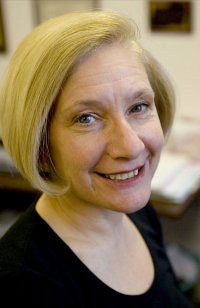[Section Voices: World Congresses of Music Therapy]
Interview with Suzanne Hanser, WFMT President, 2002-2005
By Barbara L. Wheeler
I am grateful to have this opportunity to reflect on my experience as President of the World Federation of Music Therapy and the state of the world of music therapy from 2002 to 2005.
What was happening in the world of music therapy when you were President?
The early 2000's saw the emergence of virtual reality, particularly in the mass communications network known as e-mail. For the first time, music therapists around the world had access to colleagues, almost immediately and at low cost. This revolution opened up channels of communication that facilitated widespread sharing of resources, including educational models, standards of practice and ethics, governmental accreditation guidelines, research, scholarly materials, and other ideas of mutual interest. Information-sharing across geographical boundaries accelerated evolution of the field, particularly in countries with limited publications about music therapy in their native languages. During this time, WFMT developed their own website, www.musictherapyworld.net, to gather data from member countries and inform those with no official professional organizations. The website included a particularly valuable resource to the development of music therapy globally, notably a research database, developed by Jorg Fachner and David Adridge from Germany. Discussions and collaboration with www.voices.no assisted WFMT in determining how their online resources could complement the rich offerings of the "Voices" of Scandinavia. In addition to Commissioners representing aspects of the music therapy profession, a network of Regional Liaisons from different continents were invited to sit on the WFMT Council, in hopes of accelerating the evolution of the field of music therapy amongst colleagues throughout the world. Currently, as I expand my list of Facebook and Linked In friends, and develop skype and Internet 2 connections with colleagues all over the world, I am proud to continue to extend these relationships. In addition, the WFMT website has continued to collect and share greater gobs of music therapy information and resources with anyone who is interested.
Back to the time of my presidency, in regard to the development of country-wide professional associations, changes on the political front opened borders that allowed communication to flow through new pathways around the world. During the early 2000's, as countries in Eastern Europe began to find their voices, formal music therapy organizations were established in Serbia, Poland, Slovenia, Czech Republic, and Latvia. France and Luxembourg also developed their professional associations in 2002 and 2004, respectfully. Meanwhile, the European Union worked on government accreditation for music therapists in every European country. Our representative from Japan, Nobuko Saji, invited delegates from all Asian countries to come together to share ideas and resources.
In the U.S., collaborative work between the American Music Therapy Association and the Certification Board for Music Therapists examined the entry-level and advanced competencies of a qualified music therapist. In 2005, the World Congress in Australia highlighted educational training worldwide in a special track, titled "Professional Issues" that included education and training, in addition to tracks in "Music Therapy Methods," "Clinical Practice," and "Research."
What were the highlights of your Presidency?
The primary "instrument" of the World Federation of Music Therapy is the World Congress, and a crowning moment in my career was being installed as President in the magnificent Town Hall in Oxford, England. When I asked the delegates to join me in singing a major chord, the participants modulated and added their own enharmonics, reminding us all that our voices are unique and different, and blend in infinitely creative and enriching ways.
My presidency culminated in the World Congress in Brisbane, Australia in 2005, where an exceptional array of music therapists and related professionals gathered to present innovative ideas and approaches to the field. Being in the Australian continent brought prominence to the gifted Australian music therapy community and taught the rest of us delegates about Australian perspectives on music therapy.
What were the challenges of your Presidency?
Becoming culturally competent in an ever-changing world is a great challenge. Well beyond the barrier of communication through language is lack of an understanding of culture, which affects values and mores, not to mention music, functionality of music, therapy, and bases for therapy. I realized how many assumptions I make about the practice of music therapy when I encounter a new way of looking at our profession through the eyes of someone on the other side of the world.
What is the lasting legacy of your Presidency?
As we reach out to colleagues across the globe, we strive for interconnectedness – a way to communicate, understand, and discover the underlying truths that underlie each of our various approaches, I believe that these are the factors that ultimately lead to wholeness and healing, and it is my mission to learn as many of these truths as I can in my lifetime. Although I cannot claim to have made much progress towards this lofty goal, I hope that my tiny contributions, like the inclusiveness of regional liaisons on the Council, the translation of WFMT documents (including a revised Code of Ethics) into Spanish, and the development of the website, were of value to those who encountered our confederation.
Currently, it is heartening to see an even more inclusive WFMT Council that consists of Officers, Commissioners, Regional Liaisons, and an Assembly of Student Delegates, a greatly expanded website, and rich World Congresses spanning the globe.


